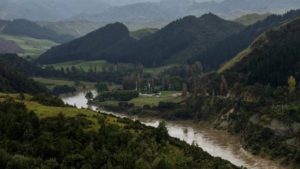“I bless the scientists and others working to cleanse the oceans, lakes and rivers in their creativity that they may devise ever more efficient ways of protecting this God-given resource.”
Pierre Pradervand, from 365 Blessings to Heal Myself and the World
Now available from the publisher, o-books.com in bookstores and other outlets.
Elizabeth Macpherson, Erin O’donnell And Felipe Clavijo Ospina, April 2018
 “The growing global movement for Rights of Nature — or the Rights of Mother Earth as some cultures prefer — seeks to define legal rights for ecosystems to exist, flourish, and regenerate their natural capacities. These laws challenge the status of nature as mere property to be owned and dominated by humans and provide a legal framework for an ethical and spiritual relationship to the Earth. While recognizing legal rights of nature doesn’t stop development wholesale, it can stop the kind of development that interferes with the existence and vitality of ecosystems. In the last decade, four countries and dozens of US communities have passed laws recognizing “legal standing” for ecosystems.” Shannon Biggs, Executive Director of Movement Rights,
“The growing global movement for Rights of Nature — or the Rights of Mother Earth as some cultures prefer — seeks to define legal rights for ecosystems to exist, flourish, and regenerate their natural capacities. These laws challenge the status of nature as mere property to be owned and dominated by humans and provide a legal framework for an ethical and spiritual relationship to the Earth. While recognizing legal rights of nature doesn’t stop development wholesale, it can stop the kind of development that interferes with the existence and vitality of ecosystems. In the last decade, four countries and dozens of US communities have passed laws recognizing “legal standing” for ecosystems.” Shannon Biggs, Executive Director of Movement Rights,
Last March, the New Zealand Parliament passed ground-breaking legislation declaring that the Whanganui River catchment (Te Awa Tupua) has “all the rights, powers, duties and liabilities of a legal person”, as part of a political settlement with Māori.
Days later, in India, the Uttarakhand High Court ruled that the Ganges and Yamuna Rivers, sacred in the Hindu religion, have the same legal rights. These cases received widespread media attention.
Less well-known is the recent landmark decision of the Constitutional Court of Colombia, which found that the Atrato River catchment is an “entidad sujeto de derechos” (legal person), as a consequence of cultural connections and rights of river-dependent Indigenous and Afro-descendent communities (adopting an ecocentric perspective and theory of biocultural rights).
Interest in this novel approach to river protection appears to be building momentum, and new river guardians have just been announced in both New Zealand and Colombia.
Similar efforts on behalf of rivers are under way in other countries, including the Tarra River in Australia.
From https://www.stuff.co.nz/environment/102741097/meet-the-river-people-who-speaks-for-the-rivers
Read more: http://www.earthisland.org/journal/index.php/elist/eListRead/when_rivers_hold_legal_rights/





